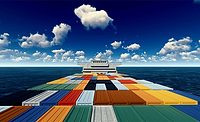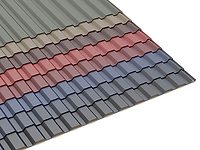Choosing the Best Paint for Metal

Finding the best paint for metal involves much more than picking a favorite color. In addition to good adhesion and rust prevention, a metal coating must be equipped to meet force-dry, high-slip, or high-temp requirements in certain applications. To address these needs, Cortec offers two specialty versions of a high-performing, water-based, anti-corrosion coating for industrial applications.
Two Anti-Corrosion Paints, Three Special Features
EcoShield® 386 FD is a water-based acrylic one-coat system that can be applied direct-to-metal (DTM) for protection in harsh, outdoor, unsheltered applications. It was specifically designed for fast-paced, force-dry applications, common in manufacturing environments. In addition to outstanding corrosion protection at 1.5-3.0 mils (37.5-75 µm) DFT (dry film thickness), the coating force-dries in just 5-10 minutes at 150 °F (65 °C) and has good hot hardness.
EcoShield® VpCI®-386 HT slip coating is another direct-to-metal water-based topcoat that offers excellent corrosion protection at 1.5-2.0 mils (37.5-50.0 µm) DFT. It is heat resistant up to 500 °F (260 °C) or more (depending on color), and improves surface slip. The coating is thixotropic, and resists sagging and running during application. Both are UV-resistant and low-VOC coatings.
Where Are Force-Dry, Extra-Slip, High-Temp Coatings Needed?
While it would be difficult to list all the industrial applications where force-dry, extra-slip, or high-temp coatings could be used, the following examples are excellent springboards for exploring options.
- Force-Dry Applications: Fast-paced manufacturing applications are the number-one candidate for the water-based acrylic coating. Many spray or dip lines move so quickly that the parts pile up at the end of the line. This is bad news if parts are hot and sticky. They could easily adhere to each other and potentially damage the coating when components are pulled apart. Designed for force-dry applications, the coating has good hot hardness and will reduce the risk of parts sticking together. This feature is a potentially huge advantage in countless manufacturing applications where pipes, hooks, castings, and a variety of other equipment components are made.

- Extra-Slip Applications: Electrical conduits are a prime example of where a slip coating is beneficial. A protective ID (inner diameter) coating can be critical for new piping stored outdoors or shipped through harsh, corrosive conditions. However, when it comes time to install the conduits, electrical wires must be able to slide easily through the tubing. A slip coating makes this possible, while also inhibiting corrosion. The same benefits would apply to other metal surfaces, parts, or equipment in need of a protective coating that is slippery.

- High-Temp Applications: In addition to needing extra slip, electrical conduits are a great illustration (although by no means the only example) of a high-temp application. These pipes start out as flat pieces of metal that are rolled into tubes, welded, and internally painted before the welding heat can cool down. A slip coating was designed to withstand this extra heat during coating application and similar high-heat curing processes. It can also be used on equipment that may reach temperatures up to 500 °F (260 °C) during operation.
*All images courtesy of Cortec.
Looking for a reprint of this article?
From high-res PDFs to custom plaques, order your copy today!






